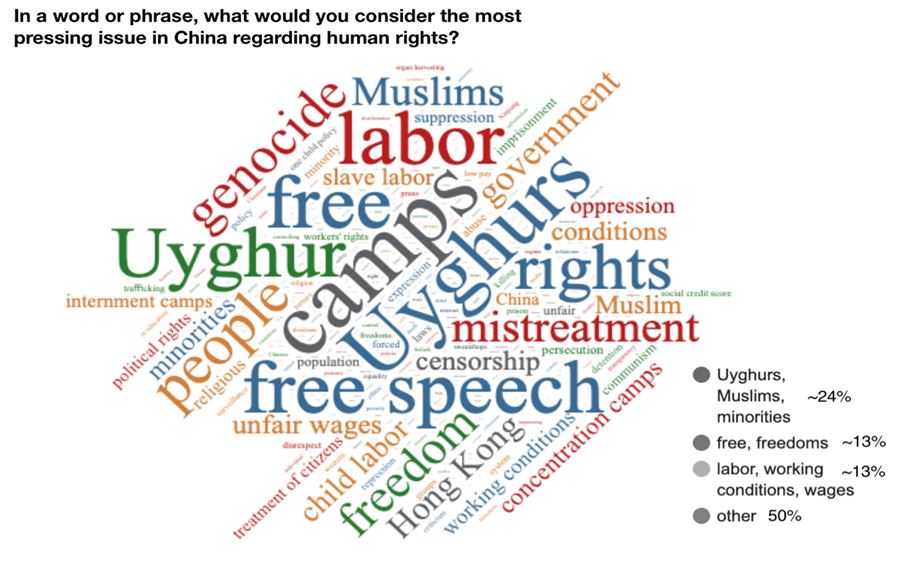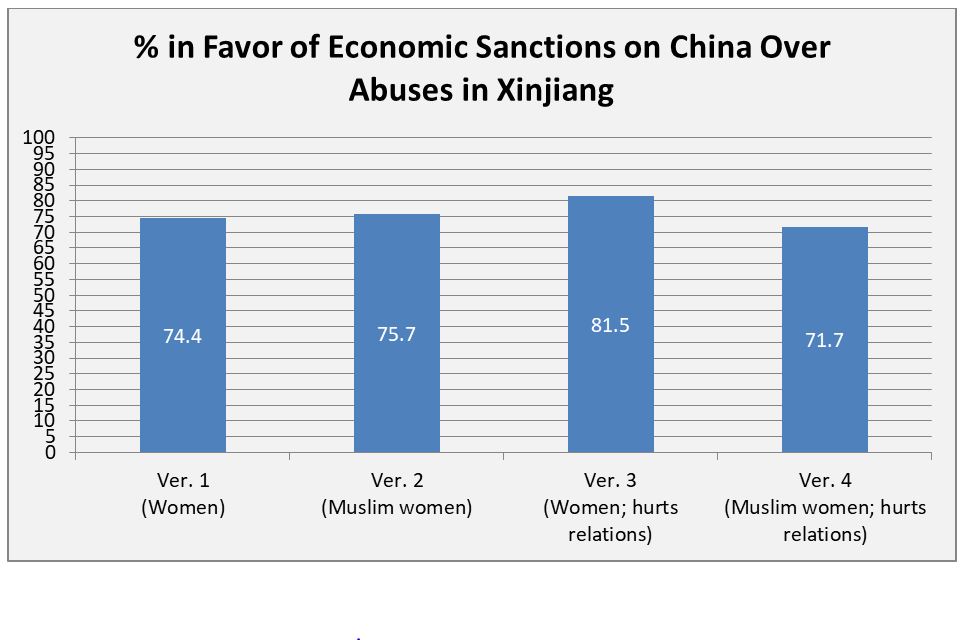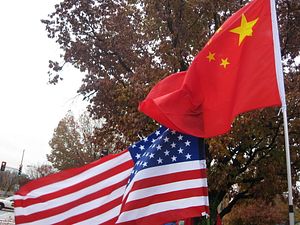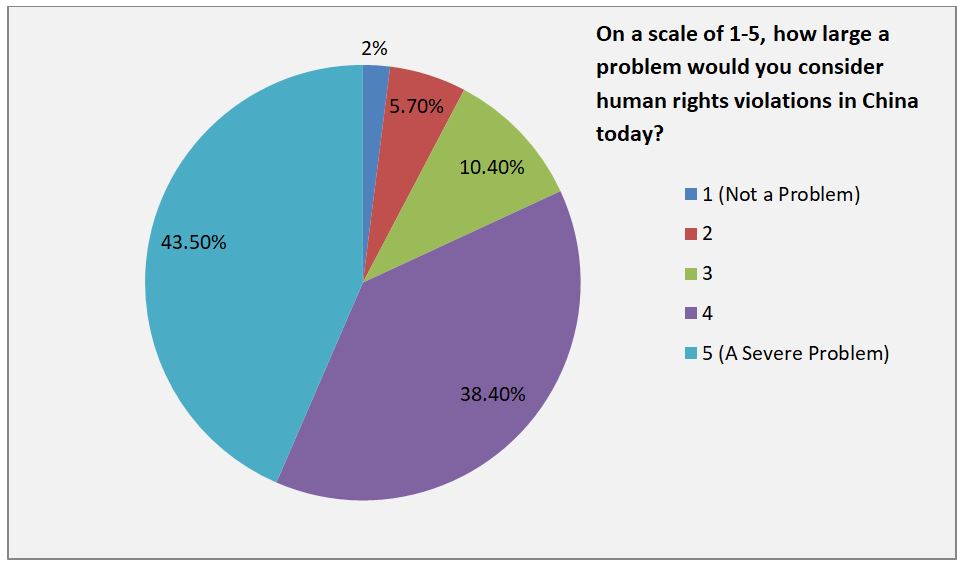The continued human rights violations by China are a frequent cause of tension in China-U.S. relations. The United States has condemned repeatedly the treatment of ethnic minorities, particularly Uyghurs in Xinjiang, and imposed sanctions for violations of human rights. Largely left out of this discussion of growing tension is how the American public perceives these human rights issues and how those perceptions will shape future relations with China.
To analyze public opinion on human rights in China, we conducted a survey of 934 American respondents via mTurk Amazon on March 4, 2021. Respondents first were asked: “On a scale of 1-5, with 1 being not a problem and 5 being a severe problem, how large of a problem would you consider human rights violations in China today?”
While the question may be leading, presupposing that the public is aware of China’s human rights issues and that they exist, we find that the vast majority of respondents (81.9 percent) see Chinese violations as a severe problem (a 4 or 5 on the scale). Broken down further, both Democrats and Republicans shared similar sentiment (82 percent and 84 percent respectively). These results demonstrate awareness that Chinese human rights violations as pressing issues that could affect policy.
In the past, the United States has taken a hard power approach to things such as “trade, security, currency, maritime claims, and intellectual property” but a soft power, or “lead by example,” approach to human rights issues. However, as the severity of the situation in western China becomes more widely known, the United States’ response has moved beyond soft power, imposing economic sanctions on selected Chinese officials as punishment.
Next, respondents were asked, “In a word or phrase, what would you consider the most pressing issue in China regarding human rights?” The figure below demonstrates the most common words or phrases mentioned in the open-ended response, with larger words appearing more frequently.
 Over 96 percent of respondents volunteered specific examples or considered general human rights violations to be an issue in China. Of the responses, approximately 12 percent specified detainment camps in western China. Others emphasized the poor treatment of workers in western China, where there are known to be factories relying on forced labor. Overall, respondents were more likely to specify concerns about Uyghurs than any other religious or ethnic minority, with nearly 15 percent of responses specifying the Uyghurs by name, compared to only 3 percent specifying any other ethnic group. This suggests Americans are increasingly aware of the Uyghurs’ plight and abuses in Xinjiang, where a few years prior the region and its people were barely known.
Over 96 percent of respondents volunteered specific examples or considered general human rights violations to be an issue in China. Of the responses, approximately 12 percent specified detainment camps in western China. Others emphasized the poor treatment of workers in western China, where there are known to be factories relying on forced labor. Overall, respondents were more likely to specify concerns about Uyghurs than any other religious or ethnic minority, with nearly 15 percent of responses specifying the Uyghurs by name, compared to only 3 percent specifying any other ethnic group. This suggests Americans are increasingly aware of the Uyghurs’ plight and abuses in Xinjiang, where a few years prior the region and its people were barely known.
Finally, we assigned respondents randomly to one of four versions of a question regarding human rights in China, so that we could identify how framing may influence perceptions. The versions were:
Version 1: Recent reports allege that women in Western China are being systematically raped in internment camps. Should the United States place economic sanctions on China?
Version 2: Recent reports allege that Muslim women in Western China are being systematically raped in internment camps. Should the United States place economic sanctions on China?
Version 3: Recent reports allege that women in Western China are being systematically raped in internment camps. Should the United States place economic sanctions on China, even if it worsens relations between the U.S. and China?
Version 4: Recent reports allege that Muslim women in Western China are being systematically raped in internment camps. Should the United States place economic sanctions on China, even if it worsens relations between the U.S. and China? The data shows clear majorities answering in support of sanctions across versions, with Version 3 with the highest support (81.5 percent), while Version 4 generated the lowest (71.7 percent). This pattern endures when separated by party or by gender, further suggesting tolerance of sanctions even if relations with China worsen as result.
The data shows clear majorities answering in support of sanctions across versions, with Version 3 with the highest support (81.5 percent), while Version 4 generated the lowest (71.7 percent). This pattern endures when separated by party or by gender, further suggesting tolerance of sanctions even if relations with China worsen as result.
These figures suggest that the American public is increasingly aware of issues relating to Chinese human rights violations, likely due to increased media coverage. Data on U.S. perceptions of human rights in China demonstrates that many believe the mass incarceration and surveillance of the Uyghurs is a prominent human rights crisis. However, the increase of negative American media coverage regarding these issues has also influenced Chinese perceptions of the United States. Research conducted in 2019 on the impact of human rights pressure in authoritarian states demonstrates the propensity of citizens to become defensive when their country is criticized, especially when such critiques come from a perceived rival. Meanwhile, the more human rights abuses in China are highlighted and discussed, the more likely American support for policies such as sanctions will continue.
Thus, as the U.S. continues to push China on human rights and Chinese citizens become less interested in what is seen as anti-Chinese rhetoric, bilateral relations are likely to continue to deteriorate.
Studies have found that resilient bilateral relations require mutual identification, while perceptions of another state as “other” in terms of values or culture had the opposite effect. In addition to influencing how Americans view China, a perception of “otherness” may further affect how Americans view religious groups in China and the extent to which Americans are willing to take action to aid persecuted religious groups. While support for sanctions was lowest when our survey specifically identified persecution of Muslim women, this may shift as a growing acknowledgement of these atrocities push Americans to perceive China as the “other.” With a public supportive of continued U.S. pressure on China confronting a recalcitrant Chinese government and Chinese public dismissive of human rights claims, bilateral relations will continue to struggle.


































